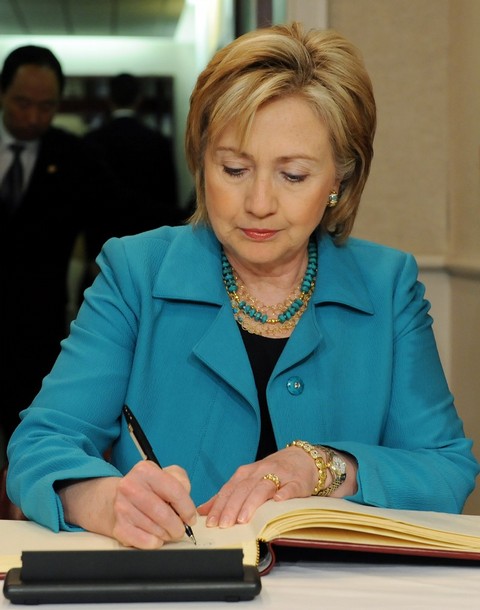Twenty-year-old
Oxana Rantchev left her home in Russia in 2001 for what she believed
was a job as a translator in Cyprus. A few days later, she was found
dead after attempting to escape the traffickers who tried to force her
into prostitution.
Oxana's
story is the story of modern slavery. Around the world, millions of
people are living in bondage. They labor in fields and factories under
threat of violence if they try to escape. They work in homes for
families that keep them virtually imprisoned. They are forced to work as
prostitutes or to beg in the streets. Women, men and children of all
ages are often held far from home with no money, no connections and no
way to ask for help. They discover too late that they've entered a trap
of forced labor, sexual exploitation and brutal violence. The United
Nations estimates that at least 12 million people worldwide are victims
of trafficking. Because they often live and work out of sight, that
number is almost certainly too low. More than half of all victims of
forced labor are women and girls, compelled into servitude as domestics
or sweatshop workers or, like Oxana, forced into prostitution. They face
not only the loss of their freedom but also sexual assaults and
physical abuses.
To some, human trafficking may seem like a
problem limited to other parts of the world. In fact, it occurs in every
country, including the United States, and we have a responsibility to
fight it just as others do. The destructive effects of trafficking have
an impact on all of us. Trafficking weakens legitimate economies, breaks
up families, fuels violence, threatens public health and safety, and
shreds the social fabric that is necessary for progress. It undermines
our long-term efforts to promote peace and prosperity worldwide. And it
is an affront to our values and our commitment to human rights.
The
Obama administration views the fight against human trafficking, at home
and abroad, as an important priority on our foreign policy agenda. The
United States funds 140 anti-trafficking programs in nearly 70
countries, as well as 42 domestic task forces that bring state and local
authorities together with nongovernmental organizations to combat
trafficking. But there is so much more to do. The problem is
particularly urgent now, as local economies around the world reel from
the global financial crisis. People are increasingly desperate for the
chance to support their families, making them more susceptible to the
tricks of ruthless criminals. Economic pressure means more incentive for
unscrupulous bosses to squeeze everything they can from vulnerable
workers and fewer resources for the organizations and governments trying
to stop them.
The State Department's annual
Trafficking in Persons Report,
released this week, documents the scope of this challenge in every
country. The report underscores the need to address the root causes of
human trafficking -- including poverty, lax law enforcement and the
exploitation of women -- and their devastating effects on its victims
and their families.
Since 2000, more than half of all countries
have enacted laws prohibiting all forms of human trafficking. New
partnerships between law enforcement and nongovernmental organizations,
including women's shelters and immigrants' rights groups, have led to
thousands of prosecutions, as well as assistance for many victims.
The
2009 report highlights progress that several countries have made to
intensify the fight against human trafficking. In Cyprus, where Oxana
Rantchev was trafficked and killed, the government has taken new steps
to protect victims. Another example is Costa Rica, long a hub for
commercial sex trafficking. This year, it passed an anti-trafficking
law; trained nearly 1,000 police, immigration agents and health workers
to respond to trafficking; launched a national awareness campaign; and
improved efforts to identify and care for victims. This progress is
encouraging. Much of it is the result of the hard work of local
activists such as Mariliana Morales Berrios, who founded the Rahab
Foundation in Costa Rica in 1997 and has helped thousands of trafficking
survivors rebuild their lives. Advocates such as Mariliana help spur
change from the bottom up that encourages governments to make needed
reforms from the top down.
We must build on this work. When I
began advocating against trafficking in the 1990s, I saw firsthand what
happens to its victims. In Thailand, I held 12-year-olds who had been
trafficked and were dying of AIDS. In Eastern Europe, I shared the tears
of women who wondered whether they'd ever see their relatives again.
The challenge of trafficking demands a comprehensive approach that both
brings down criminals and cares for victims. To our strategy of
prosecution, protection and prevention, it's time to add a fourth P:
partnerships.
The criminal networks that enslave millions of
people cross borders and span continents. Our response must do the same.
The United States is committed to building partnerships with
governments and organizations around the world, to finding new and more
effective ways to take on the scourge of human trafficking. We want to
support our partners in their efforts and find ways to improve our own.
Human
trafficking flourishes in the shadows and demands attention, commitment
and passion from all of us. We are determined to build on our past
success and advance progress in the weeks, months and years ahead.
Together, we must hold a light to every corner of the globe and help
build a world in which no one is enslaved.

